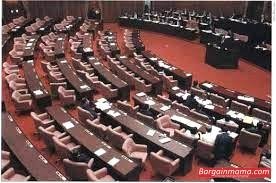Taiwan’s Political Turmoil Unfolds
Taiwan, often regarded as a model of democracy in East Asia, is now grappling with disturbing political instability. Recent violent altercations in the Legislative Yuan, particularly on December 20, reveal the growing tension and raise concerns about the future of Taiwan’s democracy.
The December clash was marked by physical brawls, including wrestling, kicking, and water-throwing. It erupted when the Democratic Progressive Party (DPP), the ruling party, took extreme steps to prevent the opposition from passing key amendments. Legislators from the DPP barricaded themselves inside the building overnight, and their supporters attempted to storm the legislature. Although such disruptions have been part of Taiwan’s political culture for years, the recent escalation in violence signals a deeper issue within Taiwan’s democratic processes.
The Root Causes of the Conflict
At the heart of this turmoil lies the DPP’s diminished power in the legislature. A coalition of opposition parties, including the Kuomintang (KMT) and Taiwan People’s Party (TPP), now controls the majority, leaving the DPP with limited influence. In response, the ruling party has resorted to desperate measures to block opposition reforms.

A major scuffle occurred on May 17 when the DPP attempted to thwart opposition efforts to pass bills that would increase legislative oversight over the president. Despite the DPP’s resistance, the bills passed in June, prompting Taiwan’s leader, William Lai Ching-te, to challenge them in court. The constitutional court later ruled most of the reforms unconstitutional.
The December 20 violence centered around opposition amendments aimed at redistributing funds to local governments and adjusting the vote threshold for recalling elected officials. The DPP, desperate to maintain its influence, claimed that the opposition was attempting to create a “parliamentary dictatorship,” but these claims have been widely dismissed as exaggerations.
A Democracy in Crisis?
In any functioning democracy, debates and disagreements should be settled through discussion, not through physical confrontations. Taiwan’s ruling party, however, has crossed this line, raising serious concerns about the stability of the country’s political system.
The DPP’s rhetoric has only heightened the sense of crisis. Accusations that the opposition is acting in Beijing’s interest have further polarized the political climate, undermining constructive dialogue.
Meanwhile, a group of protesters known as the Bluebird Movement, while presenting themselves as grassroots and independent, has shown strong support for the DPP’s stance and opposed the opposition at every turn. The movement has staged multiple protests near the legislature, even attempting to break into the building on December 20.
Regional Parallels and International Concerns
Taiwan’s political unrest has drawn comparisons to South Korea’s recent struggles. In South Korea, President Yoon Suk-yeol, faced with a legislature that opposed his agenda, attempted to impose martial law. Although this effort was quickly quashed, it raised alarms about the fragile nature of democracy when power is contested.
A controversial social media post by Taiwan’s DPP briefly drew a parallel between its current situation and South Korea’s, further fueling tensions. The post was removed, but not before it sparked public outrage and required the DPP to clarify its position, assuring the public that martial law would not be implemented.
A Troubling Development for Taiwan
The actions of the DPP are deeply concerning. By instigating violence, obstructing legislative processes, and spreading divisive rhetoric, the ruling party is undermining the democratic principles it claims to uphold. The situation raises critical questions: Can a ruling party repeatedly resort to physical confrontations to block legislation? Is it appropriate for the DPP to encourage protests aimed at disrupting the legislative process?
These developments mark a troubling departure from Taiwan’s tradition of vibrant, albeit often unruly, democracy. The party’s conduct undermines the very democratic values it has championed for years.
Looking Ahead: The Future of Taiwan’s Democracy
As Taiwan moves into 2025, the hope is that the political climate will stabilize and that future legislative disagreements will be resolved without resorting to violence. Taiwan’s democracy has endured for decades, but this year’s events have raised fears that it is now at a crossroads.
The challenge for Taiwan’s political leaders is clear: they must find a way to engage with each other constructively, moving beyond physical confrontations and inflammatory rhetoric. This will require both the ruling DPP and the opposition to prioritize governance over partisan maneuvering.
The future of Taiwan’s democracy depends on whether the island’s political leaders can heal the divisions that have deepened over the past year. The actions of both parties will determine if Taiwan can emerge from this period of turmoil stronger or if the damage done will have lasting repercussions.
A Wake-Up Call for Democracies Everywhere
Taiwan’s struggles provide a stark reminder of the vulnerabilities that even well-established democracies face when political power is contested. The need for cooperation, mutual respect, and compromise is more urgent than ever.
As the Legislative Yuan continues to echo with brawls instead of debate, Taiwan’s political leaders must reflect on their roles as stewards of democracy. The world is watching closely to see if Taiwan can reaffirm its commitment to democratic values, or if its democracy will continue to deteriorate under the weight of political discord.
In the coming months, Taiwan’s political future remains uncertain. However, with the right leadership, the country can weather this storm and restore its reputation as a strong democracy in the face of regional challenges.



